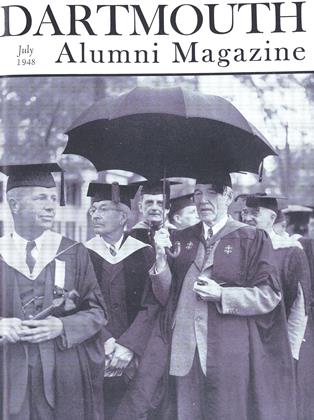It is my extremely pleasant duty to inform you that Dartmouth won the championship of the Eastern Intercollegiate Baseball League this spring with a record of 7 wins and 1 defeat (by Yale). In the process of fabricating this sterling triumph, the Green defeated Pennsylvania, Columbia, Cornell, Navy, Harvard, Princeton, and Brown. They were defeated (as noted) by Yale and were thwarted from playing the Army by repeated postponements because of inclement weather. When Columbia obligingly knocked off Yale and the Army game was rained out (again and again and again), Coach Jeremiah's charges were in.
We shall not attempt to provide a playby-play report of the last few contests on the schedule, events which would hardly come under the designation of spot news by the time this communication is in your hands. The heady intelligence of the League victory should be enough for all practical purposes at this juncture, plus a few general remarks about the composition and spirited behavior of the club. This aggregation was a young team, heavily loaded with sophomores (see below for a more detailed roster) and with all the zest that comes with youth. Spurred by the inspiration of the wily Jeremiah, this team ran bases with dash and abandon, stretching singles into triples, pulling delayed and double steals, and otherwise engaging in heads-up and aggressive play.
In addition to their youthful ebullience, the chief distinguishing feature of this championship team was the presence of several good pitchers, a form of skilled operative rather conspicuously absent in recent years. Led by the colorful Emil Hudak, who continuously captivated the clients with his handkerchief tricks on the mound, Coach Jeremiah had Bob Amirault, Al Quirk, Billy West, and Jack Lockyer, each of whom could (and did) contribute some pretty fair country pitching on occasions. While nobody in this group was in the same class as Yale s Quinn or Navy's Burton, the staff as a whole was far superior to anything the league could muster. When encouraged by some robust work with the willow by the home team, any one of these pitchers could hold off the redskins until the Federals came.
In terms of skilled agents who will be around for another year or so, Coach Teremiah is in an enviable position. As noted, the club is primarily a sophomore aggregation, with the vital spark delivered in many instances by the youngsters. Numbered among the outstanding performers in the sophomore class are pitchers Emil Hudak, Billy West, and Jack Lockyer, catcher Rog Frechette, shortstop Buddy Bray, and outfielders Joe Day and Hank Mueller. Captain Ed McNeil is officially only a junior and is available for another year. Pitchers Bob Amirault and Al Quick, and third baseman (and hockey captainelect) Dick Desmond are also juniors with another year of competition.
One slightly jarring note intruded into this idyllic picture and should be reported in the interests of accuracy. That is the fact that Dartmouth was not invited to compete in the N.C.A.A. championship play-offs, this honor for the New England district being ceremoniously handed to Yale. It is true that the Elis slapped their one League defeat upon the Green, but the won-and-lost record for Dartmouth was far superior to that of the Yales, plus the minor matter that Dartmouth won the League and Yale didn't.
In the final game of the season before an overflow Commencement crowd, Bob Amirault tossed a gaudy one-hitter past the bewildered bats o£ a Maryland aggregation that came all the way up north to have their ears pinned back 3-0. In one of the fanciest exhibitions of mound wizardry seen in these parts in many a long year, Amirault held the opposition to a solitary single (a drive that just grazed McNeil's fingers and dropped into short right field for a single). The flinging Frenchman had perfect control and walked nary a man.
 View Full Issue
View Full Issue
More From This Issue
-
 Article
ArticleThe Commencement Address
July 1948 -
 Class Notes
Class NotesTwenty-Three's Twenty-Fifth
July 1948 By TRUMAN T. METZEL -
 Class Notes
Class Notes1918's Terrific Thirtieth
July 1948 By ERNEST H. EARLEY -
 Class Notes
Class Notes1898's Golden Anniversary
July 1948 By JOHN R. SPRING '98 -
 Class Notes
Class Notes1933 s Fabulous Fifteenth
July 1948 By GEORGE F. THERIAULT -
 Article
ArticleCollege Holds 179 th Commencement
July 1948
Francis E. Merrill '36
Sports
-
 Sports
SportsBasketball Schedule
December 1943 -
 Sports
SportsIntramural Newsletter
June 1938 By Bob Haslam '39. -
 Sports
SportsFOLLOWING THE BIG GREEN TEAMS
December 1935 By C. E. W. '30 -
 Sports
SportsBasketball
February 1934 By C. E. Widmayer '30 -
 Sports
SportsMISCELLANY
June 1948 By Francis E.Merrill '26 -
 Sports
SportsGOLF
May 1929 By Phil Sherman



